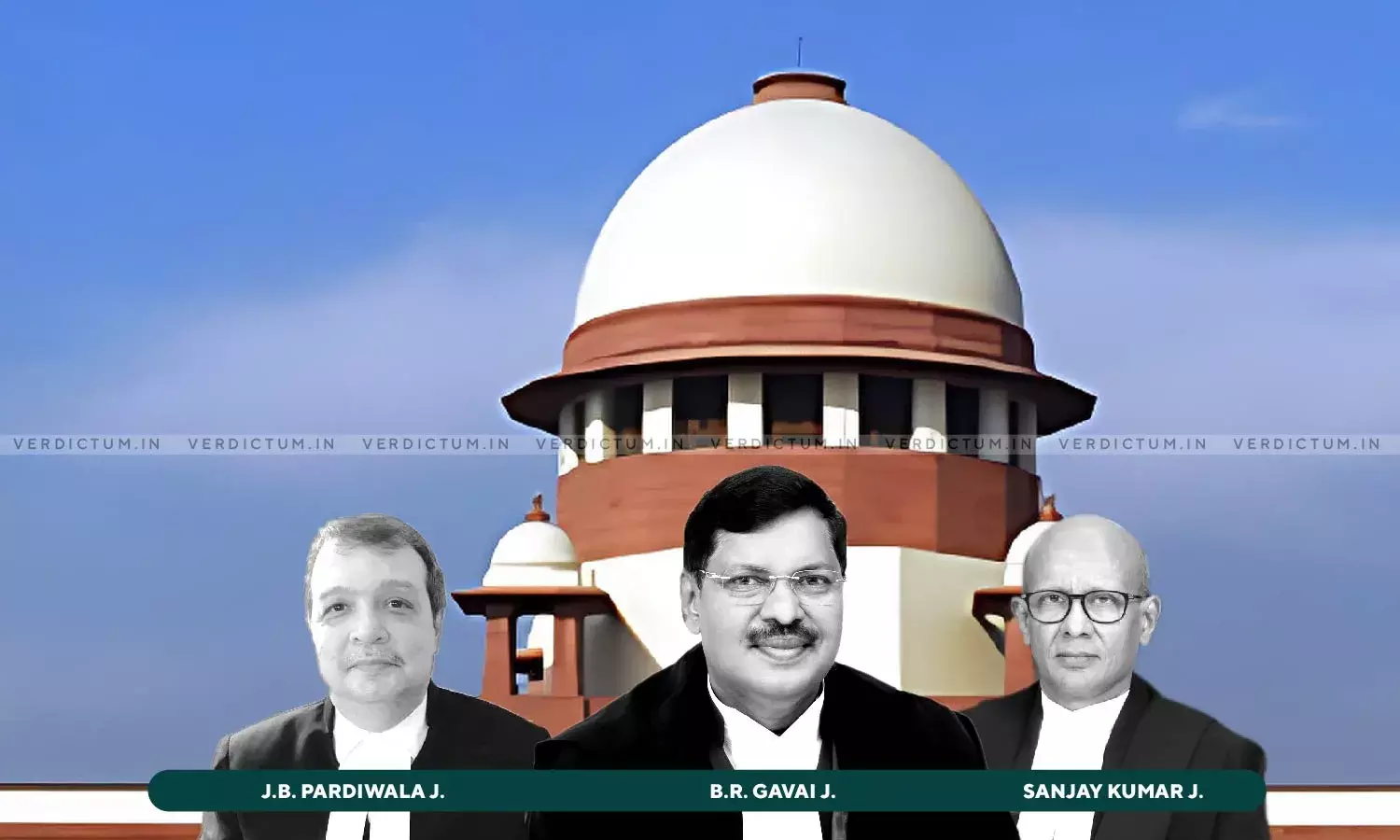Higher Principle Of ‘Proof Beyond Reasonable Doubt’ Shall Prevail: SC Directs Acquittal Of 3 In Minor's Murder Case Citing Slipshod Investigation
The Supreme Court directed the immediate release acquitting three appellants of murder due to insufficiency and irregularities in the prosecution's case, emphasizing the importance of adhering to proper investigative procedures and the need to establish guilt beyond a reasonable doubt in cases based on circumstantial evidence. The three convicts earlier had appealed to the High Court against the judgment of the Additional Sessions Judge, and their convictions and sentences were upheld, including the death penalty for the brother and son.
A three judge Bench of Justice B.R. Gavai, Justice J.B. Pardiwala and Justice Sanjay Kumar held, “that the manner in which the police tailored their investigation, with complete indifference to the essential norms in proceeding against the accused and in gathering evidence; leaving important leads unchecked and glossing over other leads that did not suit the story that they had conceived; and, ultimately, in failing to present a cogent, conceivable and fool-proof chain of events pointing to the guilt of the appellants, with no possibility of any other hypothesis, leaves us with no option but to extend the benefit of doubt to the appellants.”
A minor was brutally killed. A neighbor, his brother and his son were accused and stood trial for the murder and related offenses. They were convicted by the Additional Sessions Judge in Jabalpur, Madhya Pradesh. Neighbor was found guilty under Section 364A of the IPC (Indian Penal Code) and sentenced to life imprisonment. His brother and son were convicted of offenses under Section 302 of the IPC and other sections, including 364A and 201 IPC. They were sentenced to death and other prison terms.
Senior Advocate Sidharth Luthra appeared for the Appellants and Advocate Pashupathi Nath Razdan appeared for the Respondent.
The Court noted significant issues in the prosecution's case, including inconsistencies, procedural concerns, and potential violations of legal standards related to confessions made to the police. The Court emphasized that the crucial question was whether the appellants could be considered to be in police custody when they made their confessions and whether these confessions could be admissible as evidence.
The Court determined that the son was not in police custody until he was formally arrested, as he was not initially named as an accused in the First Information Report (FIR). Therefore, his confession made prior to his arrest was inadmissible under Section 26 of the Evidence Act. The same reasoning applied to the neighbor and his brother, who were also not named as accused in the FIR until they were arrested and taken into police custody. Consequently, their confessions and any evidence derived from them could not be used against them.
The Court discussed the importance of proper procedure in conducting searches and seizures by the police. It highlighted that panchnamas (witnessed records of searches and seizures) should be prepared meticulously to ensure that evidence is not planted or tampered with. The Court emphasized the need for independent and respectable witnesses during such procedures. The Court provided specific conditions that must be met for a valid panchnama, including the recording of search proceedings, clear descriptions of seized items, and the attestation of the panchnama by witnesses.
The Court scrutinized the manner in which panchnamas and memos were prepared in this case and found that they lacked the necessary detail and independent witness involvement, casting doubt on the validity of the evidence collected. The Court added, “Witnesses to the panchnamas and the seizures acted as mere attestors to the documents and did not disclose in their own words as to how these objects were discovered, i.e., at whose instance and how. Ergo, no lawful validity attaches to these proceedings recorded by the police in the context of collection of all this evidence.”
The Court also questioned the reliability of DNA evidence presented, particularly regarding the plausibility of the victim pulling hair from the assailant during the attack. The Court said, “The possibility of Ajit Pal, held by a much taller Raja Yadav, managing to get his hands on Rajesh Yadav’s head, who was also much taller than him, whereby he could have plucked out any hair is inherently improbable. This scenario does not lend itself to credibility and seems to have been concocted so that Rajesh Yadav’s hair would be conveniently available for DNA analysis to corroborate the prosecution’s case.”
The Court raised concerns about the investigation's lapses and shortcomings, including the failure to follow up on important leads, inadequate coordination, and unscientific methods of collecting evidence. The Court said, “The proverbial last nails in the coffin of the prosecution’s case, if at all needed, are the shocking lapses and the slipshod investigation on the part of the police.”
The Court concluded that the prosecution's case was riddled with inconsistencies, lapses, and gaps in the evidence, making it impossible to establish the appellants' guilt beyond a reasonable doubt. The Court said, “No valid and acceptable reasons were put forth as to why this case qualified as the ‘rarest of rare cases’, warranting such drastic punishment. Per contra, we find that the yawning infirmities and gaps in the chain of circumstantial evidence in this case warrant acquittal of the appellants by giving them the benefit of doubt. The degree of proof required to hold them guilty beyond reasonable doubt, on the strength of circumstantial evidence, is clearly not established.”
Consequently, the Court allowed the appeals, set aside the convictions and sentences of all three appellants, and ordered their immediate release unless they were held for valid reasons in other cases. Any fines paid were to be refunded within eight weeks.
Cause Title: Rajesh & Anr. v. The State of Madhya Pradesh, [2023INSC839]
Click here to read/download Judgment












